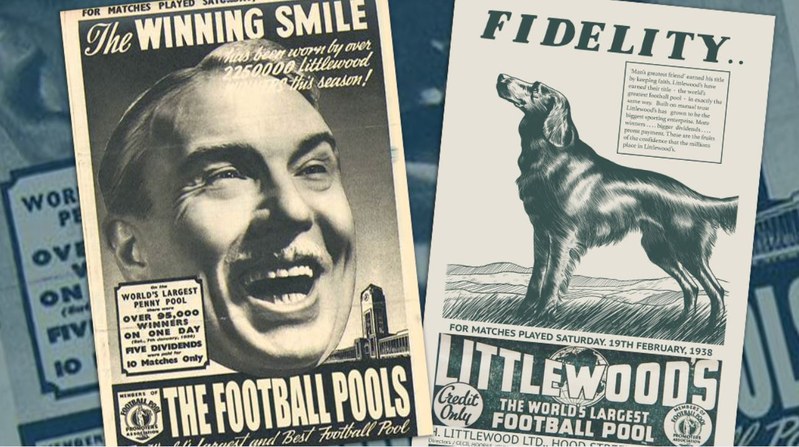
There was a time, well before the National Lottery and other forms of winning money, when the football pools was the most exciting way to have a gambling without really feeling as though that is what you were doing. By the end of the Second World War, the football pools accounted for around 15 million postal packets every single week, with over 100,000 people working in the industry by the 1950s. That gives you an indication of just how popular it was, which is impressive when you consider that is was simply people guessing the outcome of football matches.
The pools might not even have existed if not for the dogged persistence of John Moores, who knew that he had a good product but initially struggled to persuade football fans that it was something that they should get on board with and play on a weekly basis. Eventually, though, they did come around and the pools grew to become one of the biggest ways of gambling in the United Kingdom. By 1936, the pools account for around four million of every six million postal packets being sent. The good times couldn’t last forever, though, with the National Lottery being a nail in the coffin of the football pools.
In the modern era the Pools has, however, reinvented itself and still draws a hugely loyal fanbase. There are all the classic games you have come to love plus a whole host of new games, made possible by the fact the system is now all online. You can visit the Pools and see the products they have today by clicking the image above. In 2021 The Pools launches a new sportsbook, powered by a third party platform called FSB. This now means users can access all the modern betting products but can still play all the classic pools games too.
The Origins Of The Pools
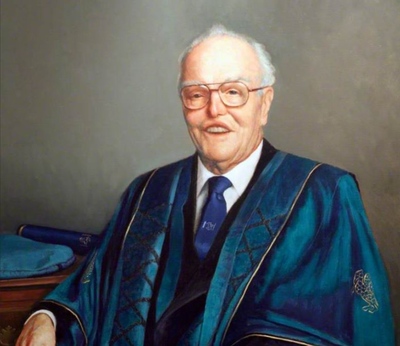
On the tenth of September 1887, the Cricket and Football Field newspaper offered one guinea in prize money for people who correctly predicted the result of four football matches that were due to be played on the Saturday. When you consider that that was the year before the English Football League had been formed, it just goes to show that the desire to correctly figure out football results is one that goes back quite some years. Readers could enter by cutting out a coupon, filling the results and sending them into the paper.
That competition had no fee to enter apart from the cost of postage, with readers encouraged to enter several times as the newspaper knew that this would result in increased sales. Other papers soon began to run similar competitions, so that by 1910 readers of The Umpire were chasing after a prize of £100 that would be paid to those that could correctly predict six football results. It is likely that all of this gave John Jervis Barnard the idea to run a football pools, in which punters would wager on the result of matches.
His idea was the prize for correctly guessing the results of matches would be whatever was paid into the ‘pool’, minus ten percent for his administrative costs. Sadly for him, the idea struggled to take off, but word of his endeavour reached a trio of men called John Moores, Colin Askham and Bill Hughes. Hughes had managed to obtain one of the coupons and showed it to the others, who believed that they could do a better job of running the enterprise. So it was that they launched the Littlewood Football Pool on the first of February 1923.
The name Littlewoods had been decided upon because the men were working for the Commercial Cable Company at the time. Outside employment was completely banned, so the men figured that naming the new venture after themselves was asking for trouble. Askham had been orphaned as a child and thought that calling it after his birth name, Colin Henry Littlewoods, was the best way forward. Moores and Hughes agreed, so the Littlewoods Pools was born and would go on to become a business behemoth.
The Early Years Of Littlewoods
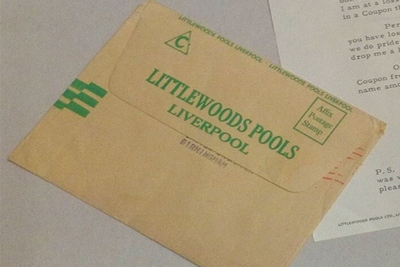 The men rented a small office in Liverpool and printed out 4,000 coupons, heading to Old Trafford, the home of Manchester United, in order to distribute the coupons one Saturday in the winter of 1923. Moores was the most keen of those involved, so he handed out the coupons himself, aided by some boys that were looking to earn a few pennies working in the cold. It did not go well. Just 35 coupons were returned, amounting to bets of £4, 7 shillings and sixpence. The ten percent that was deducted failed to even cover the expenses the men had incurred.
The men rented a small office in Liverpool and printed out 4,000 coupons, heading to Old Trafford, the home of Manchester United, in order to distribute the coupons one Saturday in the winter of 1923. Moores was the most keen of those involved, so he handed out the coupons himself, aided by some boys that were looking to earn a few pennies working in the cold. It did not go well. Just 35 coupons were returned, amounting to bets of £4, 7 shillings and sixpence. The ten percent that was deducted failed to even cover the expenses the men had incurred.
Rather than giving up, they decided to double-down, printing 10,000 coupons before heading to Hull to try and sell them. In spite of the increased number of coupons on offer, there were actually fewer sales than there had been at Old Trafford and just one coupon was returned. Still, the men persisted but they could not get their pools idea to take off. By midway through the 1924-1925 season, having invested £200 each in the project, they continued to lose money. Hughes, keen to cut his losses, suggested that they abandon the project and Askham was in agreement.
Moores still had faith in the pools idea, however, and offered to buy both men out by returning their £200 investment to them in return for their shares in the company. Keen to at least recoup something, both men agreed and Moores became the sole owner of Littlewoods. Perhaps he would also have given up if not for the words of his wife, who said, “I would rather be married to a man who is haunted by failure rather than one haunted by regret.”
What happened next is something that Hughes and Askham almost certainly questioned themselves about year after year, for the football pools was about to take off.
The Pools Goes Big
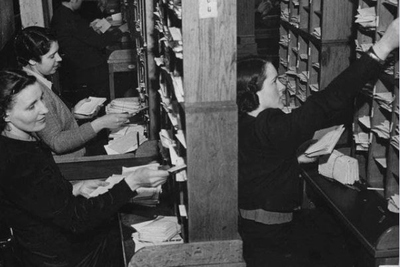
Quite why the football pools suddenly earned the attention of the public is difficult to tell. All we know is that people soon began accepting the presence of Moores around football ground and began filling in their coupons. It is possible that the fact that football became more popular at a time when placing bets on it was illegal drove interest, but whatever the reason, enough people engaged with Littlewoods Pools that John Moores was prosecuted under the Ready Money Betting Act. He was able to avoid falling foul of it, however, because the Pools didn’t accept cash, only postal orders.
By 1930, Moores had become a millionaire. Any suspicion that people had about the pools was removed by the fact that rival companies had begun to spring up. Vernon’s Pools launched in 1925, for example, with Zetters being founded in London in 1933. The following year, Littlewoods, Vernon’s and Zetters came together to create the Football Pool Promoters’ Association, joined by other big pools companies like Cope’s Pools, W.S. Murphy and Western Pools, which were based in London, Edinburgh and Newport respectively.
The bigger the pools grew, the more there were some that wanted to take it down. A report by the Royal Commission said that it should be prohibited, but the pools organisers told their customers to write to their MPs, leading to the proposals to ban it being dropped. Any legal attempts to restrict the pools failed because of the claim that it was a game of skill rather than fortune. It was also difficult to clamp down on the pools because the transactions were ‘binding in honour only’. On top of that, up to half of the entry fees were returned to players as prizes.
To give an indication of just how well the pools was doing, there were 28 companies offering a pools competition by 1936 and their revenue had reached nearly £30 million. Two-thirds of all postal packages being sent were entries into one of the pools, but the English Football League wasn’t happy. The footballing body decided to combat the pools by withholding information about the fixtures, meaning that the pools companies couldn’t print their coupons in time for the weekend. If a game involved a long journey, information about that would be published on Thursday, otherwise it wouldn’t be known until Friday.
That, of course, failed to stop the pools companies. Initially they simply printed coupons with only the home sides, then they began to received leaked fixtures. On the ninth of March 1936, the Football League abandoned its war with the pools companies and started printing the fixtures early again. During this time, Bernard had continued to sell his own competition but decided to sell it to Cope’s Pools in 1938. The thing that did the pools the most damage during that era was the outbreak of the Second World War, during which time the Post Office refused to deliver pools coupons.
Post-War Popularity
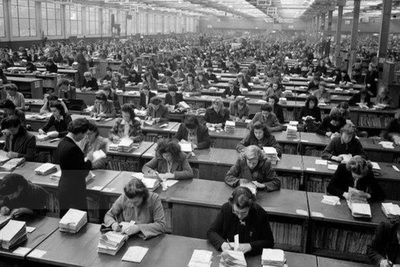 In the wake of the Second World War, the pools companies saw their popularity grow even further. The launch of the Treble Chance in 1946 became one of its most popular competitions. The idea was that players would choose a link of eight results, with the results bing worth the most points according to a scoring scheme. The players that got the highest scores would receive a proportion of the entry fees. It allowed for a large jackpot at a time when no other form of gambling could provide one, with premium bonds not being offered until 1957 and even then having a lower jackpot.
In the wake of the Second World War, the pools companies saw their popularity grow even further. The launch of the Treble Chance in 1946 became one of its most popular competitions. The idea was that players would choose a link of eight results, with the results bing worth the most points according to a scoring scheme. The players that got the highest scores would receive a proportion of the entry fees. It allowed for a large jackpot at a time when no other form of gambling could provide one, with premium bonds not being offered until 1957 and even then having a lower jackpot.
Customers also found that the games that there were able to play would depend on the company that they played with. You could bet on the hard-time scores, for example, or on which matches would feature a given number of goals. Within a couple of years, the revenue from the pools had increased to £70 million, with Littlewoods, Cope’s and Sherman’s dominating the market. A 1959 ruling by the High Court of Justice, which said that the Football League owned the rights to its fixture list, resulted in a deal with the pools to pay 0.5% of the stake received to the English and Scottish Football Leagues.
By the time the 1972-1973 season came around, the deal between the Football League and the various pools companies was extended for 13 years and was worth £23 million. More and more games began to be offered, such as the ‘8 Homes’ one, or the ‘5 Aways’. The idea of the pools also made it overseas, with European countries offering their own versions of it. Indeed, the Intertoto Cup was created by pools companies in order to be able to provide matches for people to bet on during the summer, running from 1961 until 2008.
How It Worked
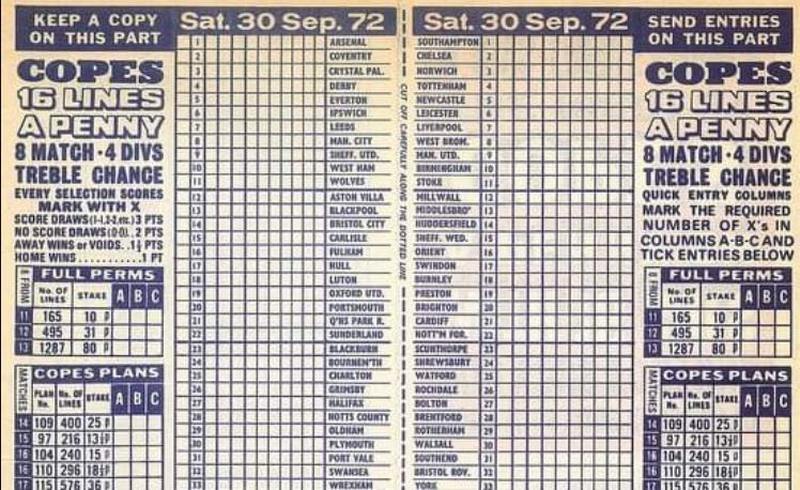
It was traditional for entries in the pools to be made via the postal service, but there were also collectors who would go around and gather in coupons, receiving 12.5% of the money bet as their fee. They would take the coupons into the regional offices before they were dispatched to the central offices. It wasn’t unusual for people working in a business or factory to be a collector for the pools as a side-hustle.
The manner in which the scoring of games worked on the pools depended on the game that was being played.
Players would select their results, being awarded three points for a score draw, two points for no-score draws, one point if it was a home win or one and a half points for an away win. The score of each line was then calculated for a maximum of 24 points. The player that achieved the top score that week would get the ‘top dividend’, meaning that they would get the biggest payout. Players that got close but missed out would also receive a payout.
In 1963, an extremely cold winter made the pools companies realise that not all matches would be played.
The Pools Panel

The winter of 1962 to 1963, which resulted in games being cancelled across England, led to the creation of the Pools Panel.
It initially featured Ted Drake, Tom Finney, Tommy Lawton and George Young, who were all former footballers, and ex-referee Arthur Edward Ellis. The members changed regularly over the years that followed, but the idea was always the same. The Panel would meet and decide upon the ‘result’ of matches that either hadn’t been played in time or were abandoned for one reason or another.
The Pools Panel continues to meet each Saturday between November and April, with decisions released once all matches that are taking place hit half-time but before any results are known.
By 2016, the Panel had been reduced to just three people. Results from matches and the decisions of the Pools Panel were broadcast on the BBC’s Grandstand as part of its Final Score report. This only began to stop when the proliferation of the internet meant that fewer people needed to learn the results that way.
Winning The Pools
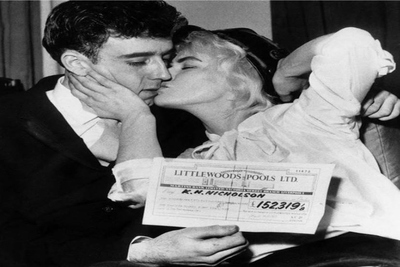
Typically speaking, only a fraction of a penny would be charged for each line entered in the football pools. Players could choose to pay a higher stake and therefore win a larger share of the jackpot if successful. The low cost of it would result in players often entering several different lines on a single entry.
It wasn’t unusual for people to cover all variations, for example, which cost 45 times more than a single entry, given there were 45 possible outcomes. The pools companies themselves even issued ‘plans’ for how to submit a permutation.
The biggest prizes tended to be issued when one line was entered and scored the maximum number of points that were available.
In 1961 a lady named Viv Nicholson declared that she would ‘spend, spend, spend’ after her husband won more than £150,000 on the pools.
It took 11 years for the prize to break the half a million pounds barrier, with Cyril Grimes winning £512,683 in 1972. In 1986, a syndicate of hospital workers won in excess of £1 million, becoming the first such group to do as much.
The National Lottery Causes Decline
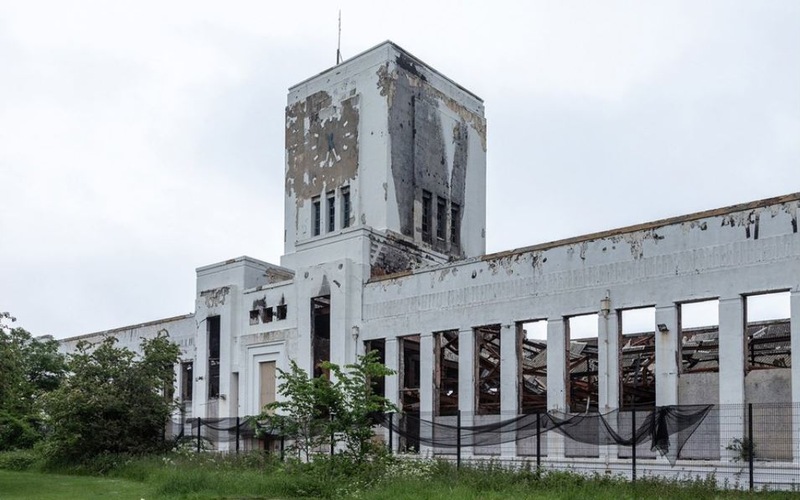
The National Lottery’s launch in 1994 killed the football pools almost overnight. Though there had been a double-million winner of the pools in 1991 and the highest UK win of all time in 1994, the prize of £2,924,622 won by a syndicate on the inaugural weekend of the National Lottery paled in comparison to the jackpot of £5,874,778 offered by the Lottery.
Not only was the prize bigger and the lottery easier to understand, it wasn’t linked to football in any way so more people were able to play it without worrying about a sport they didn’t understand.
The pools soldiered on gamely, of course, but when online betting became a real possibility in the mid-2000s, the writing was very much on the wall. Punters were happy to make the move online too, meaning that they didn’t need to worry about the likes of coupons or score-draws. It killed the pools in a way that the arrival of betting shops to Britain’s high streets in 1961 didn’t quite manage to do.
Given that both a decent accumulator payout and a National Lottery jackpot win would pay out more than the pools, it became an activity that fewer and fewer people wanted to play.
The Modern Football Pools

Try as they might, neither the National Lottery nor the move to online betting managed to completely kill off the football pools. In 2000, a company named Sportech Plc decided to pay £161 million for the rights to the Littlewoods Pools. Two years later and the newly named Littlewoods Gaming also bought Zetters to create something of a football pools behemoth. When Vernon’s was added to the company in 2007, it was clear that Sportech Plc saw a future for the football pools in an online world, so they re-branded as ‘The New Football Pools’.
Though it was always going to be impossible for the pools to match the popularity that it had enjoyed in the years when it was the only legal way to bet on football, it has endured. Thousands of players play the game on a regular basis, such as when 15 players shared a £4 million jackpot in 2010 before the same number of people shared £3 million later in the same year. Michael Elliott was on the receiving end of the biggest ever payout for an individual when score draws in England, Scotland and Spain saw him win more than £3 million.
The pools benefits from loyal players. Though the numbers have dropped from a height of more than ten million players to around 700,000, those that do play do so on a regular basis. In 2017, Sportech Plc took a slight loss on the pools and sold it to a private equity firm named Opcapita for £83 million in cash. The top prize of the classic pools is £3 million and you can play it for as little as £1. There are numerous different games to be played when it comes to the New Football Pools, which helps it to maintain interest.
Games You Can Play
| Game | How To Play | Cost | Top Prize |
|---|---|---|---|
| Classic Pools | Select ten fixtures from those on offer, with the aim being to find eight that will end in a score-draw | £1 per game | £3 million if you correctly identify the nine games out of 49 that end in a score-draw when they are the only nine that end as a score-draw |
| Goal Rush | Pick eight matches, this time aiming for those that you think will see both teams scoring | £2 per game | £1 million if you correctly identify the first eight matches in which both teams score. Seven correct guesses earns a consolation prize |
| Premier 6 | Predict the outcome of six football matches, opting for Home Win, Away Win or Draw | £2 per line | Varies according to how many people play and pay into the pool |
| Premier 10 | Correctly predict the outcome of ten pre-selected matches, choosing between Home Win, Away Win or Draw | £1 per line | Varies according to how many people play and pay into the pool |
| Premier 12 | As with the other ‘Premier’ games, predict the outcome of 12 pre-selected matches in order to win, deciding on whether they will end as a Home Win, Away Win or Draw | 50p per line, minimum stake of £1 | Varies according to how many people play and pay into the pool |
| Lucky Clover | Guess which numbers will be drawn in the Irish Lottery | £1.50 per draw | Match three and win £700, match all six and win £1 million |
If you want to play the football pools then you absolutely still can. Here’s a look at some of the games that are on offer to modern day players:
Does The Pools Have A Future?
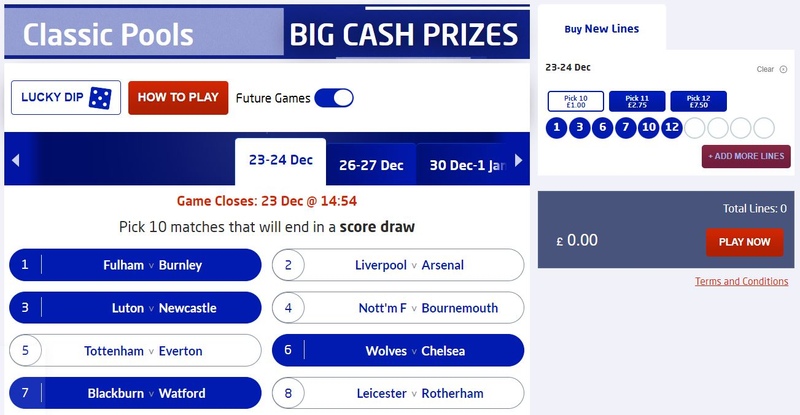
The trickiest question to answer when it comes to the football pools is what its future looks like. There’s no question that it has endured over the years, but the fact that the Football Pools site has broadened its horizons in numerous different ways suggests that the company behind it knows that it needs to offer more than just pools betting.
At the current stage of proceedings, it is difficult to tell how many people are still playing it out of habit or because a parent played it rather than because it is a worthwhile competition.
That being said, the endurance of the pools means that it is likely to be around for as long as there are people that want to bet on it. Unless the National Lottery is folded and people can no longer bet online, the football pools will always remain a second-class citizen in terms of the betting world. That doesn’t mean, though, that there aren’t still thousands of people keen to play it week-in, week-out.
It is also likely that more and more people are stumbling across it all the time, meaning that its audience is growing. It offers a viable alternative to the likes of a football accumulator, so will always have appeal.
